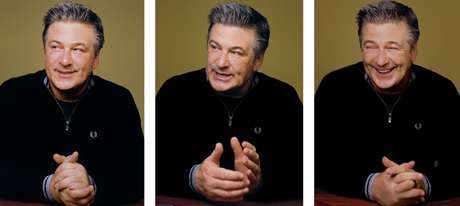From a sticky divorce to the infamous voicemail exposing him to public humiliation, Alec Baldwin has been through a lot in the past few years. And yet, the 30 Rock star with a leading role in the upcoming film, My Sister’s Keeper, has made it through the fire relatively unscathed. Baldwin opens up to Michael Fleming of Playboy Magazine about his recent struggles, opinions on politics and pop culture, and his plans for retirement and running for office when the sun sets on his acting career.

Alec Baldwin, actor, 30 Rock
Playboy: Setting up this interview was like trying to shoot a moving target. It took months for you to carve out time in your schedule. Not many actors your age are so busy.
Alec Baldwin: For me to have any career opportunities at the age of 51 is a miracle. But it’s all about 30 Rock. We’ve won every prize they give out, some twice. People need to laugh right now. Tina Fey and her writers are so good, they’ve skewed things for me.
Playboy: How?
AB: People send scripts now, and I read them and go [breathes in loudly], “I don’t know. It’s more cute than funny.” I work with people who are really funny. It sets the bar high.
Playboy: You, Tina Fey and Tracy Morgan are very different. On what level do you connect?
AB: I love Tracy because he is this sweet kid from the Bronx, a real New Yorker who went from comedy clubs in the outer boroughs into the 212 area code with Caroline’s and then stardom on SNL. But he’s still childlike. When he was told he was going to host SNL, he burst out crying in front of us; he couldn’t believe they’d asked him. He’s among a handful of people in my life who always make me laugh. He’s sick and perverted but in a wonderful way. He’s my favorite pervert.
Playboy: How about Tina Fey?
AB: Tina’s a smart and sexy woman who writes with an edge and thinks like a guy. The success of 30 Rock is not how many people watch the show but who’s watching the show. Industry people watch. There are shows far more successful than we’ll ever be that nobody in my business watches. So when NBC chief Jeff Zucker or NBC programming honcho Ben Silverman or SNL and 30 Rock producer Lorne Michaels are having lunch at the Grill and people walk up and say, “My kid downloads that show, and we watch the DVD boxed set,” it’s enormously gratifying.
Playboy: You’ve had enough classic moments on SNL to fill your own DVD. Which skit do people bring up most often?
AB: “Schweddy Balls.” It’s going to be on my tombstone: HERE LIES ALEC BALDWIN AND HIS SCHWEDDY BALLS.
Playboy: Did you turn down any sketches for being too outrageous?
AB: Probably a few. It’s hard to remember. I’m often asked if I think about going into politics. If I do, these guys will have a field day. I’ve given them so much crap to use against me—Canteen Boy, Schweddy balls. I just did the Wii sketch. Did you see that?
Playboy: Describe it.
AB: I did this with two SNL guys. I’m their father, and I show them that the best way to shake the Wii wand is to go like this [simulates masturbation], and we’re doing this obscene, horrible thing. Google or YouTube that one; it’s just ridiculous. While I’m doing it, I’m thinking, If I run for political office, they’ll have a forest of material to kill me with.
Playboy: Can comedy be held against you?
AB: I always hope people will understand that what I do as an entertainer is totally different from the way I behave. The day you say “I am a candidate,” you have a different responsibility. You hope the American public has the ability to delineate what of your private behavior matters and what doesn’t. If a guy’s a drunk driver, he has shown a lack of judgment that could hurt people. A womanizer? Well, you don’t know what someone’s going through in their marriage. Maybe he or she was miserable and unhappy, and if they were seeking companionship from someone else, that’s none of my business. If they don’t pay their taxes? That I’d worry about. The truth is, you have to assume they’ll slam you for all of it.
Playboy: Your hosting career spans 14 SNL episodes. Who are the most impressive cast members you’ve worked with?
AB: Phil Hartman, Will Ferrell and Will Forte. Hartman used to just amaze me. But maybe the most impressive moment I witnessed on the show involved Mike Myers. He hosted a Japanese game show in which Chris Farley is tortured when he doesn’t answer the questions right. Myers took my breath away. He just so nailed it, doing all this phonetic Japanese. We were peeing in our pants.
Playboy: Do you watch a lot of television?
AB: No. I’ve watched 60 Minutes and The Sopranos on Sunday nights, and I cried when The Sopranos ended. I don’t watch anything else.
Playboy: Why did you say yes to 30 Rock?
AB: It’s shot in New York. Lorne Michaels made a provision in my contract that says I would never miss my visitation with my daughter. I work a limited number of days a week, and then I’m on a plane. That was the biggest consideration. The pilot was funny, the show got funnier, and by the end of the first season people were saying glowing things.
Playboy: You’ve clashed with studio heads and producers. What bothers you about the way Hollywood works?
AB: I worked for Warner Bros. on The Departed, and I just did My Sister’s Keeper with Cameron Diaz. My problem with Warner Bros. is that it’s part of the same company as TMZ, and it’s like that with all these companies—Extra, Access Hollywood, Entertainment Tonight. I would be so happy if those shows went off the air. It is a huge problem in our business—this microcosmic analysis and elevation of people who are just witless and talentless, or people with talent, like Lindsay Lohan, who struggle. Who gives a shit about their personal trivialities? It hurts the business.
Playboy: TMZ’s Harvey Levin ran the audio of the biting voice-mail message you left your daughter. How mad were you?
AB: I thought about suing Warner Bros. My attorneys told me digital or electronic property of a minor is the intellectual property of the parent or legal guardian. TMZ was not allowed to release that tape without my approval. I don’t think they did anybody any favors. Everybody knows Levin is a human tumor, a graceless character who lives in that weird netherworld. I don’t blame those pathetic people; they are what they are. This is about the company. Warner Bros. wants me to do a movie and then shoves it up my ass with another company down the hall. You work for Paramount, and they say, “We want you to promote the movie you’ve done for us by going on a TV show we own. We’re going to double dip and make money on you both way”. They’re not paying me serious appearance fees, and as a union member I have a big problem with that. You want me to do appearances now on Entertainment Tonight? Pay me. Are you making a profit on Access Hollywood and Entertainment Tonight? Everybody says, “Do it for free because you’re promoting your movie”. Pay me.
Playboy: We take it you’re not winning this one.
AB: It’s the stance my union should take. Promotional activities for films and television shows have replaced talented marketing and publicity departments. These division heads want to walk into a meeting and say, “We ran this star up the flagpole, nobody saluted, and the movie bombed. So the movie bombed because nobody liked so-and-so.” They’ve relieved themselves of any responsibility by tying the marketing to the star’s name. They psychologically abuse talent by going, “Hey, if the movie bombs, it’s bad for you.” They’ve psyched you into thinking you’ve got to run around the country for four weeks, telling the same anecdotes over and over until you want to drop dead. You miss your child’s volleyball game because if the movie doesn’t do well, it reflects on you. They’ve conspired to wash their hands of any responsibility.
Playboy: Would you be reluctant to work with Warner Bros. again?
AB: Well, I did My Sister’s Keeper after that. The publicity I do now is modest because I don’t think it makes a difference. Why am I even here with you? Do you think this is something I enjoy?
Playboy: It’s not?
AB: I want to assure you of something. Four out of five actors I know wouldn’t do this if their life depended on it—unless they felt pressure to promote a film. That’s exactly how I feel. I wouldn’t be sitting here with you, talking about this crap and my opinions of the business. I wouldn’t bother. I like you personally. I wouldn’t talk to somebody who was a shit heel. If Harvey Levin wanted to interview me, I would tell him to go drown. But if this wasn’t about promoting My Sister’s Keeper and maybe 30 Rock and the movie I’m now doing with Meryl Streep, I wouldn’t waste fucking five minutes on it.
Playboy: Did you always feel this way?
AB: When you’re younger you get sold that it’s vital. Bit by bit you see through that. Like the Today show. I’m on an NBC show, and Today was considered vital. But when that voice-mail tape thing happened, Matt Lauer interviewed Levin before he even called me. Lauer put Levin on Today, and they never phoned me. When it’s in their interest to reach me, they know how. I saw that and said, “My relationship with the Today show is over.” I’ll never do Today again, ever. Life’s too short.
P: But media everywhere focus on TMZ.
B: NBC will periodically give you that NBC-family spiel. I expected that, since I was starring on an NBC show, I would have gotten a phone call and they would’ve said, “Would you like an opportunity to come in and talk about it?”
Playboy: Would you have accepted?
AB: I probably would have done that before I did The View. I raced in to do that show. Whoopi Goldberg is a friend. I called her and said, “Do you think I can get a fair shake?” Because when you talk about family law and parental alienation, there is this unfortunate gender-based dynamic. Could I walk into a show with a strong female audience? Would they understand my point of view? I trusted Whoopi and Barbara Walters. Whoopi is an impeccably decent person, and I am grateful she gave me a forum.
Playboy: When you hit back at Levin, reports say you outed him as a homosexual. Was that fair?
AB: No, I don’t think I outed him. I thought Levin had been candid about that. But for a long time he wasn’t. I have nothing against people who are homosexual, but I find it funny that people in that tabloid world keep their own secrets. They want the world at large to respect that but spend their lives outing the secrets of others. I find Levin peculiar and hypocritical.
Playboy: You’ve had a front-row seat at intrusive celebrity coverage—helicopters at your wedding, photographers trying to snap pictures of your newborn. Is it still this bad for you?
AB: No. Those magazines focus on people who are younger and newer. I’m 51 and have moved into another world, where they’re done with you—unless you do something. The three quickest ways to get back into that loop are: Don’t pay your federal income taxes, get drunk and try to bolt through airport security with a gun in your suitcase, and last but not least, get a DUI and be arrested in Malibu. A series of events could heat up that pot again, but the benefit of being older is they don’t care about me.
Playboy: Why is there such an insatiable appetite to see stars in unflattering moments?
AB: This society is very wired together, and it’s the most neurotic a society has ever been. Twitter, all this stuff, I don’t view as anything good. Everyone is so hyperaware of what everybody else is doing. Everybody has been convinced their opinion should count. We all need to be spouting opinions. I’m now giving you an opinion about opinions.
Playboy: You are.
AB: Another element is how distant government has become for the average person. People want their opinion to count somewhere, so they’ve transferred the desires and expectations of their democratic voice over to entertainment. They don’t have any input into what the government does. There is a chasm thousands of miles wide between Washington and the people. That’s why shows like American Idol are so important: People want to think they can affect something in that Roman gladiatorial way—thumbs up or thumbs down. I’m not saying public officials are exempt, because every time the people can gang up and condemn a public official, they do.
Playboy: When you hosted SNL recently, you jokingly thanked Christian Bale. Whose audio tirade was worse?
AB: Mine was worse by far because it involved parenting. Christian Bale’s was a skirmish with a colleague on set, and the only odd thing was how long it went on. Probably on half the films I’ve done I’ve seen someone lose it. You’re shooting and someone gets in your eye line, or a light blows when you’re really onto something as a performer. A phone goes off or a walkie-talkie. I’ve seen people lose it on behalf of their creative expedition. It’s frustration, nothing personal. Mine was so much different.
Playboy: What reaction hit you hardest?
AB: The most harrowing for me was negative mail I got from people who were critical but not hating or condemning. What hurt was that it was heartfelt. They’d say, “My father or my mother did this to me one time, and I’ve never forgotten it, never gotten over it.” Wow. I still believe the people who released the tape only made it worse, but the worst part for me was the way it touched the people who parent their kids. I’m thinking of my next book being about this.
Playboy: After all that, you’ll write a book about parenting?
AB: It will be ironic for some people, but I’m going to write a parenting book. We’re at, not a crisis, but an awful place right now in terms of parenting. People are raising their children with the belief that we need to be friends with our children. Kids have too much power and call too many of the shots, telling their parents what they will and won’t do.
Playboy: Why has this happened?
AB: In my gut I feel it’s another manifestation of how hard life has become. People are working hard to make money and manage their feelings about what the country’s going through. We live in stressful times. People come home, walk up the driveway, put the key in the door, and they just can’t do another hard job. Parenting your children effectively is a tough job.
Playboy: You write in your book that after the tape leaked you offered to leave 30 Rock and even thought of jumping out a window. How serious were you?
AB: Very serious.
Playboy: What did you learn from all this?
AB: Don’t lose your temper and act out in that way. I spoke to a lot of professionals, who helped me. If I hadn’t left that message, I wouldn’t have left myself open for that. On the other hand, I left the message with the presumption of privacy. I never dreamed they would do that. I was mortified, stunned. And not for me, because if I blew my brains out, a cadre of people on the other side would be elated. If I committed suicide, they would have considered that a victory. Destroying me was their avowed goal.
Playboy: This is your ex’s legal team?
AB: Oh, it’s a whole them. But the important thing is, when they released that, I was devastated for my daughter, who goes to school with other showbusiness kids. When parents are doing their job, these kids admire their moms and dads as entertainment professionals. When you go the opposite way, and this happens—I couldn’t imagine anything more overwhelming for my daughter.
Playboy: How did you repair your relationship with her?
AB: All I will say is, I met a therapist, one of the few smart therapists in the court-appointed family-law business. Most of them are racketeers who turn you upside down and shake your pockets out onto the table. But this guy said, “This is hard for you to believe right now, but you are the child’s father, and a child has only one father. Your child will come back to you. Her nature is to come back to you.” And over time that’s indeed what happened.
Playboy: Ironically, in your new film, My Sister’s Keeper, you play a lawyer in a child-custody battle.
AB: [Laughs] I tried so hard to put just a little sheen of oil on him.
Playboy: Did your experiences shape your character?
AB: No, because if I had put in the things I might have wanted to, it would kill the movie. My character is very sympathetic, an epileptic who has a seizure in the middle of the trial. My guy’s on the right side of the issue, representing a young girl in a medical-emancipation case. He’s not a divorce lawyer, but I tried to give him the requisite oily sheen of most lawyers I know.
Playboy: Do you really have it in for lawyers?
AB: I’ve met women since I’ve been single, and the minute I find out one is a lawyer, I’m like, “Check, please.”
Playboy: Compared with the controversial things you’ve said in the past, your words seem more measured now.
AB: I think it just doesn’t help anybody. I’ve watched people go at it, like Rosie O’Donnell and Donald Trump. All the negativity in my ugly assessments of Harvey Levin or my ex-wife’s divorce lawyers, all the negativity that has been in my life—I don’t want that. Let’s say there are 10 people I’ve had real tension and conflict with in the past. I never think about them anymore; none of them live in my life now. I did The Marrying Man with my ex-wife at Disney. A lot went wrong. Almost 20 years ago I did things I would do differently now. Yet 15 years later Michael Eisner called and asked me to do his interview show on CNBC, and he was a delight to talk to. Did I enjoy doing the movie when he ran Disney? No. I set that aside. Jeffrey Katzenberg ran the studio back then, and many of the frictions I had on The Marrying Man were with him. He called and said, “Would you come and do Madagascar with us?” I had a great time; he was an absolute gentleman. You’ve got to set those things aside.
Playboy: When did you come to this realization?
AB: For me, everything changed when I turned 50.
Playboy: How?
AB: Suddenly life is too short. 30 Rock has spoiled me in terms of realizing there’s nothing like having an audience for what you do. You realize you have plenty of time left but none to waste. And you don’t want to do anything you don’t want to do anymore.
Playboy: What’s the biggest downside of being 51? What do you miss about the guy who starred in The Marrying Man and The Hunt for Red October?
AB: About being younger? Having dark hair. When you get older, you look older, and there’s nothing you can do.
Playboy: At least you have plenty of hair, even if it’s gray.
AB: I’ve got hair for five guys. That’s one thing I am proud of. I don’t miss much else. I still throw a football with people at work all the time. I play tennis. But now, at 51, boy, my arm hurts the next day. You don’t recover as well, and you don’t want to get hurt. I ski, but if visibility is low, I don’t want to go out. I get a little scared. I don’t have time to lie in bed and recover for four or six weeks from a broken back or collarbone. But I’ll answer that question in a different context, in terms of what I went through in divorce. My only regret in life is that my daughter had to go through what she went through. I wonder how she’ll feel years from now, how it will affect her relationships. That is one of the greatest tragedies of the system, the reason I wrote the book. The most important thing is what is in the best interest of the child, but the system treats parents like mules. They just beat you with this incessant metronome of what’s best for your child. Who cares how much you suffer or how much you spend financially or emotionally? It’s not about you. That is a lie and a huge mistake. It should be that both parents deserve to have a life as well, with some dignity, decency and privacy, without the intrusion of these judges and lawyers, who are just the worst people you’ve met in your life.
Playboy: Could even a perfect legal system mitigate the bitterness that obviously existed between you and your ex?
AB: They have to ignore the emotionalized part of it. Judges should sit down and say, “If either of you alienates the child from the other, I will give primary and sole custody to the other person. Don’t do it.” But they don’t want to get in the way of the gamesmanship. Once one alienates the other, it’s more lawyer fees. If you get divorced, if your wife keeps your kids from you, you’re going to spend money to get them. The courts don’t want to get in the way of that commerce. A woman walks in, takes all your behavior as a father, puts it in the blender with the lawyer and paints you as a bad father for the purposes of alienating your child. That has to change.
Playboy: How did growing up with five siblings in the Long Island town of Massapequa shape you?
AB: You discover as years go by how much that determines who you become as a person. There are times I love living alone and other times I really miss a house filled with a big family. My dad was a teacher. He didn’t have money, and his six kids had to entertain themselves. My friends had money, boats, country houses, finished basements with pool tables. We had none of that. So it was my brothers and I, playing football, baseball, softball in a field adjacent to a golf course near our house. We lived there. At home everybody told jokes, finding a way to be funny. That led to what we’re all doing.
Playboy: Were you surprised they followed you into acting?
AB: My brothers had been putting one another on and entertaining one another out of necessity since they were five years old. I realize ending up in this business was natural for them. I was formed in my home, with my family, living a very simple life. I’m not some bling kind of person, no privatejet guy with big gold-encrusted jewelry. I linger on this because when I think about what the average American is, I think of my dad—the average American who wakes up every morning, puts in the hours trying to hold on to his job and do it well. If I run for office, my goal is to recognize that government doesn’t need to have lower taxes, a smaller budget. It’ll be smaller than now because we are undergoing a correction. But government needs to spend money more responsibly. It’s the only entity in this country authorized to stick its hand in your pocket and take your money, and if you don’t pay, you go to jail. It’s a disgrace, the way they just piss it away. Government needs to build roads, put satellites in the air, have bombs, ships and planes for the defense department, and schools. We need basically everything we have now. We just need to do it better. Let’s say I want you to build a highway. I’d have people come in from all around the world and explain how they built one in Germany, Italy or Riyadh, and I would turn to people in my country and say, “You’ve got six months to build the highway, and if you don’t, you’re fired.” It becomes a reservoir a certain group of politically connected people drinks from. That has to stop.
Playboy: How?
AB: Make everyone understand that when you steal on a government contract, it’s almost like treason. If I were president, I would make defense fraud treason. I would make it a treasonous act to play on the security fears of the American people, to have them authorize the building of all these things to defend and protect us, and then have you steal money inside the life of that contract. I’d send you to prison for treason.
Playboy: What about bailed-out companies like AIG cutting bonus checks?
AB: That’s a complicated question I don’t even think experts can answer now. People have contracts; it would be illegal to void them. These things were rushed by the former administration. What we need is an SEC that matters. The reason I think I would want to run for office and be good at it is, the way all this should be done is overwhelmingly obvious to me.
Playboy: Explain.
AB: You want business, but you’ve got to stand up to business. If a company says, “Hey, you break our chops about exhaust, about our factories…,” you turn to them and say, “Go. Leave. Because the jobs and tax base we’ll lose are less than what it would cost to clean up your mess, what we’ll pay later in hospitals for the people who get cancer from what you’re going to do.” I think our society is evolving that way now. This is the thing that excites me about Barack Obama: He gets that you’ll pay now or later. Tell that corporation to drop dead, get out of your state and move someplace where they need jobs so bad they’ll sell their souls for short-end money.
Playboy: Every article written about you cites your decision to do A Streetcar Named Desire on Broadway—which cost you Patriot Games—as the reason you dropped off the superstar track. Would you do it differently now?
AB: I don’t know if I’m so certain and self-assured about the choices I’ve made. Sometimes I think, What if I had done it their way? Where would it have led? You are asked to be a part of a system in which the bulk of the films you make will be forgettable but will give you an opportunity to do certain things creatively. I look at Tom Cruise, who made films that called for him to be young, fit and charming, and that appeal made him a star. When Tom wanted to give a real performance, he made Magnolia. It was like watching some alien that looked like Tom Cruise, because it was nothing you’d ever seen Tom do. That he was not given the Oscar that year for Magnolia was devastating to me. I thought he was breathtaking. Julia Roberts in Erin Brockovich—like Tom, she’s beautiful, charming, smart, funny and winning, yet she plays a self-serving woman, a little coarse and willing to go to considerable lengths to get her way. She won the Oscar. Could I have done that?
Playboy: How might that system have worked for you?
AB: You can get into that rhythm of “I’ll do one for them, one for me.” I didn’t do that. I wanted independence. I thought, You want me to do these movies, and they suck. Only later do you realize that if you do the one that sucks, you could do the one you wanted to do and have an audience for it. In spite of the reversals he has had over the past several years, the person who has done the most with that is Mel Gibson. He has made great films in all genres. Mel is everything you want in a movie star, but there’s a layer underneath him. I don’t know if the word is danger or pathos, but there’s a complexity to Mel. Apocalypto is one of the most overwhelming, exhilarating but hideously violent films I’ve ever seen.
Playboy: You mentioned to me after our first session that you had never made a truly great film. The Departed won an Oscar. You made Glengarry Glen Ross, The Hunt for Red October, The Good Shepherd, Married to the Mob. How can you say that?
AB: What I meant was, it’s one thing to make a small contribution to a great film. The goal of a film actor is for your name to be above the title in a film that is a soaring commercial success or wins an Oscar. Not you, necessarily, but the film wins something significant.
Playboy: Is that still your goal?
AB: I had to let go of that. Whatever dreams of glory I had, so to speak, I no longer have. I’m doing the TV show. When that is over, my eye is looking toward doing something else.
Playboy: Won’t TV momentum help your future in movies?
AB: I’ll be too old by then.
Playboy: Is there a performance you are most proud of?
AB: No. I don’t have the feeling for anything I’ve done in movies that equals anything in the plays I’ve done. I liked them, but take every supporting role and throw it out the window. You just come in and play your scene. I remember being around Leo DiCaprio in The Aviator and thinking, God, how gifted this guy is, how he’s taking advantage of his opportunities. I love to watch the young actor transition into the grown man on film. There was always something boyish and puckish about Johnny Depp, but I’ll never forget watching Sweeney Todd and feeling profoundly impressed by his performance.
Playboy: You say you have no regrets, but it sounds as if you wish you had trusted the system more.
AB: Yes, not that I should have but rather what might have resulted if I had? A lot depends on who sponsors you in that club. If you’re a young De Niro and you forge into a unit with Martin Scorsese or Woody Allen and the company of actors that included his former wife, or Leo with Scorsese—I didn’t have that. It’s like they’re asking you to walk down a dark alley. If it’s the right people, a door at the end leads to a fabulous wonderland. But the people who asked me to come down the alleyway? I was like, “Eh…let me get back to you.”
Playboy: Should you have gone down the alleyway anyway?
B: From time to time I wonder. Maybe I say this to myself just to medicate whatever anxiety I have, but had it worked out, I might have been seduced into doing that the rest of my life. I do not want to do this for the rest of my life. There are other things I want to do. I do what I do on a case-by-case basis, and I see that this is going to end, probably very soon.
Playboy: By your choice?
AB: It doesn’t really matter. More my choice, since I want to do other things. This is the jail with golden bars, but it would be so horrible for me to read this article and not have said there is a lot of wonderful in this business, a lot I’m going to miss. God knows, to walk away will be hard, but I’m trying to have the discipline to understand that I want to have other experiences. Maybe a private life.
Playboy: Is that realistic?
AB: I have this silly fantasy. I get married again, I have a kid. I’d love another shot at that, with everything I’ve learned. My kid’s like eight, comes home and says, “Dad, Jimmy’s mom says you were a famous actor on TV and in the movies. Is that true?” And I go, “Yes, Johnny, Dad was famous.” I whip out my scrapbooks and my DVDs and say, “Believe it or not, that’s your dad.” And my kid’s like, “You used to be on TV and everything? And now you stay home and just clean the house all day while Mom works?” “That’s right, son.” It’s a dream, that the kid doesn’t know anything about that part of my life. Our normal life is uncontaminated by it.
Playboy: How long are you committed to 30 Rock?
AB: I’ve got three more years to go.
Playboy: Will you run for office?
AB: I’ll put it this way. The desire is there; that’s one component. The other component is opportunity. A law firm in a liberal Democratic bastion in Ohio state politics sent me a binder with a cover letter that read, “Mr. Baldwin, here’s who we represent, the kinds of cases we handle, our credentials in Ohio state politics. We want you to move to Ohio and run for governor. We will launch your career.”
Playboy: Could you live in Ohio?
AB: I have sometimes thought I could move to New Jersey or Connecticut and run. I’d love to run against Joe Lieberman. I have no use for him. But it’s all fantasy. I’m a carry-me-out-in-a-box New Yorker. Here, anything can happen. Who thought Eliot Spitzer would go down the way he did? Senator Hillary Clinton left to serve as secretary of state. Two of the biggest forces gone. Maybe Andrew Cuomo will run for one of their old seats. How much longer will Chuck Schumer stay as senator? After 2013 Bloomberg will be gone. What happens then? Do I run for Congress on Long Island? What’s Tim Bishop going to do? He represents my district. People get sick, die. They’re offered lucrative deals and want to cash in and make money for their retirement. People misstep. Unfortunately, an opportunity for me may mean bad things for someone else. I don’t wish that.
Playboy: How does all this factor into your career?
AB: I’m done in 2012. In March 2012 I’ll wake up and say, “What am I going to do now? Am I done?” I think I will be done. I may finish a play or something, but I’m retiring at the wrap party.
Interview courtesy of Playboy. To view the interview as it originally appears, click here.







